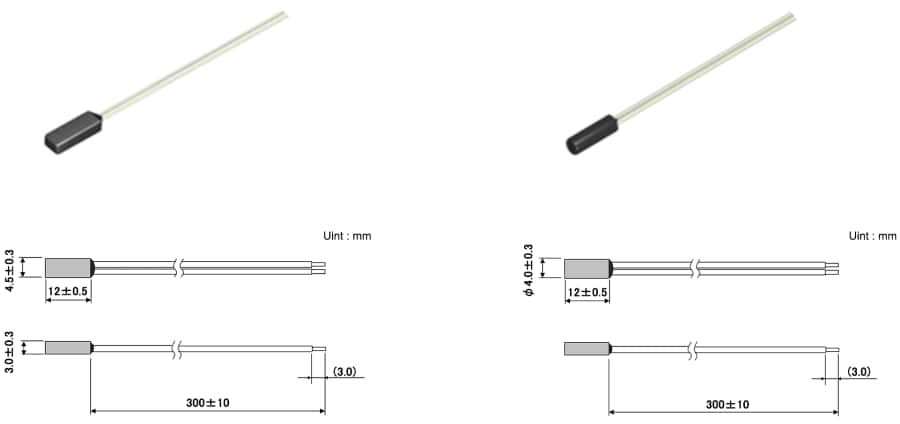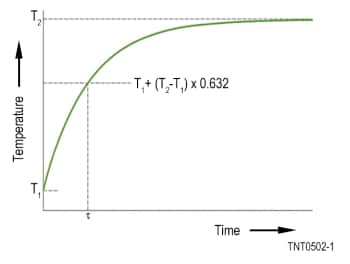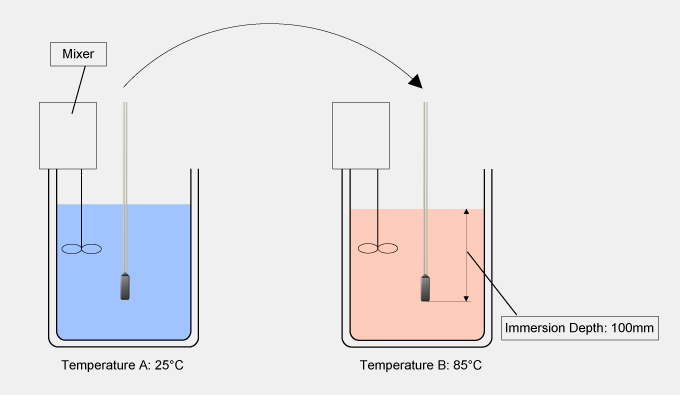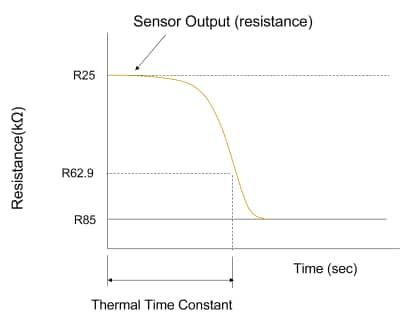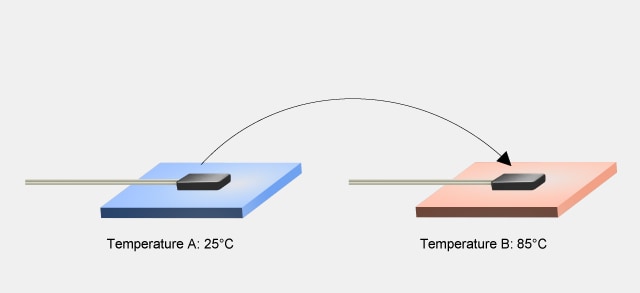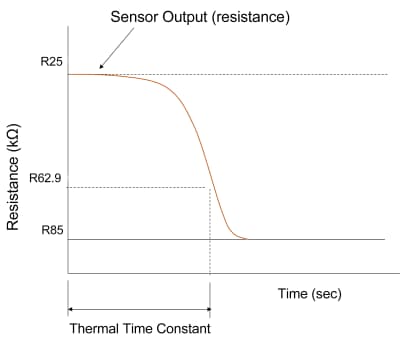NTCRP Series Thermal Time Constant (Thermal Response)

Contents
- Product Overview of NTCRP Series
- Definition of Thermal Time Constant and Thermal Responsiveness of NTC Thermistors
-
Thermal Time Constant Measurement Test with Silicone Oil
- Test Method
- Test Results (Comparison between our standard NTCRP series and similar products from other companies)
-
Thermal Response to One-Sided Heating
- Test Method
- Test Results (Comparison between our standard NTCRP series and similar products from other companies)
- Summary
Product Overview of NTCRP Series
This product is a glass-encapsulated NTC thermistor sealed in a PPS case. The case at the tip of the product has been made as compact as the smallest in the industry by resin injection molding. Depending on the environment/shape of the mounting location, you can choose from two types: rectangular type and cylindrical type. The rectangular type is suitable for mounting on flat surfaces such as square wires for motors and busbars, while the cylindrical type is ideal for wrapping round copper wires into bundles. If you have any questions about the installation method, please feel free to contact us, and our experienced technical staff will propose the optimal mounting solution for you.
What is Thermal Time Constant and Thermal Responsiveness of NTC Thermistors?
What is Thermal Time Constant?
The thermal time constant refers to the measure of thermal responsiveness. It represents how the temperature of a sensor initially at temperature T1 changes over time when placed in an environment with a different temperature, T2 (either in air or water). This temperature change over time is approximated by an exponential function.
T(t) = T2 + (T1 - T2) * e^(-t/τa)
At time t = τ,
T(τ) = T1 + (T2 – T1) * (1 – 1/e)
Thus, at time τ, the temperature change of the sensor is 63.2% of the temperature difference T1-T2. This time τ is defined as the thermal time constant.
What is Thermal Responsiveness?
Thermal responsiveness refers to the speed of response to actual temperature changes of a heat source.
NTC thermistors that quickly react to temperature changes of a heat source and exhibit a change in resistance output are considered to have high responsiveness. Generally, thermal responsiveness is influenced by the physical size and shape of the thermistor, the type of material, and the manufacturing process.
Thermal Time Constant Measurement Test Using Silicone Oil
Test Method
In silicone oil, a thermistor is moved from 25°C to 85°C. By observing the resistance-time characteristics of the thermistor when its temperature is changed from 25°C to 85°C, the time it takes for the thermistor's temperature to reach 63.2% (62.9°C) of the change is measured.
Test Results (Comparison between our standard NTCRP series and similar products from other companies)
The data below shows the results of the thermal time constant measurement test using silicone oil. Smaller numbers indicate faster response time, and TDK products have shown faster results compared to products from other companies. The fast response time allows for instant and accurate temperature measurement.
| Measurement products | Similar products from other companies |
NTCRP series |
|---|---|---|
| Thermal time constant measurement result |
4.8 sec | 4.2 sec |
Test Method for Measuring Thermal Time Constant by One-Sided Heating
Test Method
In air, a thermistor is moved from 25°C to the temperature of a hot plate set at 85°C. The side opposite to the surface where the thermistor and the hot plate are in contact is left open. By observing the resistance-time characteristics of the thermistor when its temperature is changed from 25°C to 85°C, the time it takes for the thermistor's temperature to reach 63.2% (62.9°C) of the change is measured.
Test Results (Comparison between our standard NTCRP series and similar products from other companies)
The results of the one-sided heating measurement test showed a faster response compared to similar products from other companies.
The TDK NTCRP series uses proprietary materials with high thermal conductivity for the case resin and filler material, enhancing responsiveness.
| Measurement products | Similar products from other companies |
NTCRP series |
|---|---|---|
| Thermal time constant measurement result |
18.1 sec | 12.2 sec |
Summary
We have introduced the measurement methods/results of thermal time constant using silicon oil for the NTCRP series, as well as the measurement methods/results using one-sided heating. If you have any inquiries or questions regarding the design, development, or purchase requests for the NTCRP series, please feel free to contact us."

